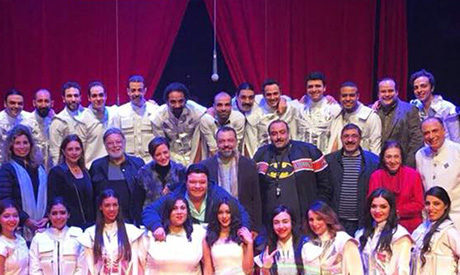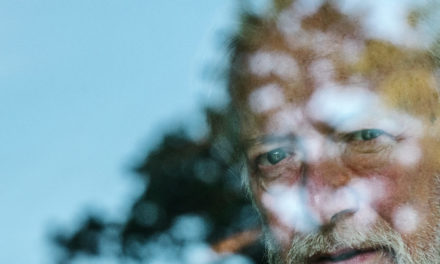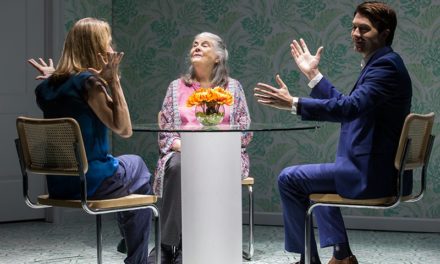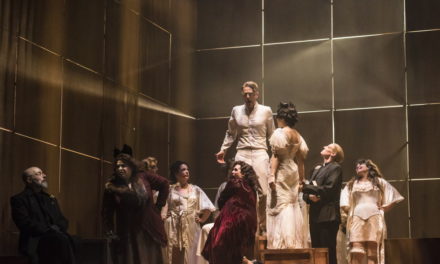Staged by the Actor’s Studio, an initiative housed by the Creativity Centre, Surrender is a play consisting of 13 scenes, on the pains of modern society, expressed by a group of young talents
Surrender (Sallem Nafsak), a play directed by Khaled Galal and staged by the students of the Actor’s Studio managed by Galal, is yet another opportunity to discover new talents which, for many years now, the director embraces and nourishes. The play has been running since it opened November 1.
The young actors’ two-year course is housed at the Creativity Centre headed by Galal and is usually crowned with a performance in front of an audience. Numerous performances staged in the past have become successful plays attended by crowds for many weeks in a row. They include such the Studio’s big hit, Black Coffee (2008), A Midsummer Night’s Dream (2002), Emergency Landing (2004), and After The Night (2014).
Following the usual pattern, the new play, Surrender, consists of a series of sketches, giving all actors an opportunity to showcase their skills in different roles.
On stage, we meet 27 actors and actresses who, over the span of two hours, highlight negative behavior in society, give hope for a better future, and make the audience laugh and cry with the sarcasm.
Galal reveals that the original material produced during the Actor Studio’s workshop spanned 23 hours, yet Surrender provides the essence of the work, condensed in 13 scenes.
As time passed fast, the audience was curious about finding out the ending. The play becomes a wake-up call to change, in order to save the future. The criticism of negative patterns of behavior is full of laughter, sadness, and opens an internal dialogue within each person watching it. Pointing out the obvious is always a big canvas for writers and comedians to work with, and that’s exactly what the play did.
The play’s plot is about a human from our time who finds himself on another planet where its inhabitants were able to create the virtuous city, organized and clean. In this society that hints at the presence of an Orwellian Big Brother, everything is engineered to reach the perfect conditions for life. The visitor from earth is considered a virus, a “weird creature” to be dealt with through scanning his brain. The scientists of the virtuous city decided to access the different files of his mind to determine if he is a danger to their society or not.
The discovery is awful as the society practices extravagance in spite of poverty and high prices, using women as a commodity and spreading rumors. We see fake art, children ungrateful towards their parents, insincere love relations, and much more. Each file is a different scene showing a negative feature in society.
All is there, from the regular layman who prefers to give the wrong directions rather than saying that he doesn’t know, to gossiping that results in the murder of a family member, and to the relatives of a dead lady faking sadness while waiting for the will to know their share of the inheritance.
Another scene focuses on suffering from high prices in the market, yet the consumption patterns of the household are ridiculous and funny for viewers.
Tragicomedy is recurrent in many instances and everyone in the audience laughs, in pain, at a man who dies in the street as those around him steal all his belongings while pretending to help. His corpse is sold to organ traffickers.
At the heart of Surrender lie the maladies of contemporary society as we are given a wake-up call, not through being preached at, but through a delicate artistic product where music, song, dialogue, and light all help shape the mood. It is in this moment that the audience looks at themselves in the mirror and discover their strengths and weaknesses. The message becomes clear: make a change before it is too late and all is lost. Another message proposed by the play touches on patriotism, whereas deep love that each person feels for this country makes change possible.
Through the workshops and hard work exerted by director Khaled Galal, the actors-students turn from amateurs to professionals, and the audience follows their talents and skills.
Surrender shows us that the talent of female stars cannot pass unnoticed as they juggle between belly dancing, singing, and portraying a variety of different characters, convincing the viewer with each of them.
In a musical scene about gossiping and turning women into merchandise, inspired by the movie Chicago, nine actresses left their print on the show. Rasha Magdi has a strong presence with her dancing and facial expression, and the way she delivered her lines that elicited an exact reaction from the audience. Other strong talents include Alhan El-Mahdy who played the role of the broadcaster and the singer and Sarah Magdi who performed the lavishing wife and also sang in the Will scene. The other actresses were not less by any means. They all possessed artistic sensitivity in acting and dancing in addition to agility and professionalism through the play’s duration.
The male actors were no less skillful than their female counterparts. Each of them has a particular style in drawing laughter from the audience and delivering the message intended. The one who caught my eye was the commander of the virtuous city, Mansour Amin, who away from the laughter created a convincing and responsible leader.
One thing is for sure: after watching this play it is certain that Egypt is prosperous in young talents. No wonder Galal’s Actor Studio is often referred to as the “Stars Factory,” since it already has and continues to bring many young stars to the limelight.
This post originally appeared in Ahram Online on December 10, 2017, and has been reposted with permission.
This post was written by the author in their personal capacity.The opinions expressed in this article are the author’s own and do not reflect the view of The Theatre Times, their staff or collaborators.
This post was written by Ossama Lotfy Fateem.
The views expressed here belong to the author and do not necessarily reflect our views and opinions.


















